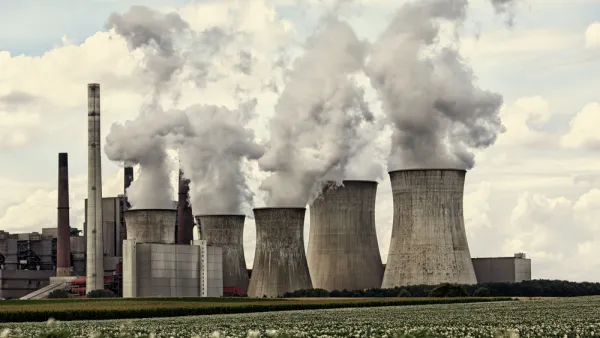A unanimous decision by a 3-judge panel affirmed a central 2009 finding of the EPA that greenhouses gases pose a threat to public health, clearing the way for applying regulations controlling their emissions to stationary sources and vehicles.
"The ruling, which addresses four separate lawsuits, upholds the underpinnings of the Obama administration's push to regulate carbon dioxide emissions, and is a rebuke to a major push by heavy industries including electric utilities, coal miners and states like Texas to block the EPA's path."
Several Reuters reporters explained the regulatory ramificatons of the ruling and their historical underpinning. The basis for the four lawsuits was the 2009 'endangerment finding' by the EPA that stemmed from the landmark Massachusetts vs. Environmental Protection Agency in 2007 "that greenhouse gases are an air pollutant that can be regulated under the Clean Air Act."
"The ruling clears the way for the EPA to proceed with first-ever rules limiting carbon dioxide emissions from newly built power plants, and to move forward with new vehicle emission standards this summer.
Brent Kendall of the Wall Street Journal explains the likely effects on coal power plants.
"The standards, first proposed in March, are expected to make construction of new coal plants increasingly unlikely as power generators opt for natural gas.
Southern Co. and Duke Energy Corp. are building two "clean coal" power plants that will turn coal into a combustible gas to make electricity. But the cost of the plants-about $3 billion apiece-means that the technology is unlikely to be widely adopted."
Kendall writes that an appeal will most likely be unsuccessful. Undoubtedly coal supporters will turn to Congress in hopes of curtailing EPA's authority. An alternative path would be to have Congress adopt a "market-based climate bill", suggested by Paul Bledsoe, a senior adviser at the Bipartisan Policy Center.
Thanks to Loren Spiekerman
FULL STORY: Court upholds EPA's greenhouse gas rules

National Parks Layoffs Will Cause Communities to Lose Billions
Thousands of essential park workers were laid off this week, just before the busy spring break season.

Retro-silient?: America’s First “Eco-burb,” The Woodlands Turns 50
A master-planned community north of Houston offers lessons on green infrastructure and resilient design, but falls short of its founder’s lofty affordability and walkability goals.

Delivering for America Plan Will Downgrade Mail Service in at Least 49.5 Percent of Zip Codes
Republican and Democrat lawmakers criticize the plan for its disproportionate negative impact on rural communities.

Test News Post 1
This is a summary

Test News Headline 46
Test for the image on the front page.

Balancing Bombs and Butterflies: How the National Guard Protects a Rare Species
The National Guard at Fort Indiantown Gap uses GIS technology and land management strategies to balance military training with conservation efforts, ensuring the survival of the rare eastern regal fritillary butterfly.
Urban Design for Planners 1: Software Tools
This six-course series explores essential urban design concepts using open source software and equips planners with the tools they need to participate fully in the urban design process.
Planning for Universal Design
Learn the tools for implementing Universal Design in planning regulations.
EMC Planning Group, Inc.
Planetizen
Planetizen
Mpact (formerly Rail~Volution)
Great Falls Development Authority, Inc.
HUDs Office of Policy Development and Research
NYU Wagner Graduate School of Public Service



























